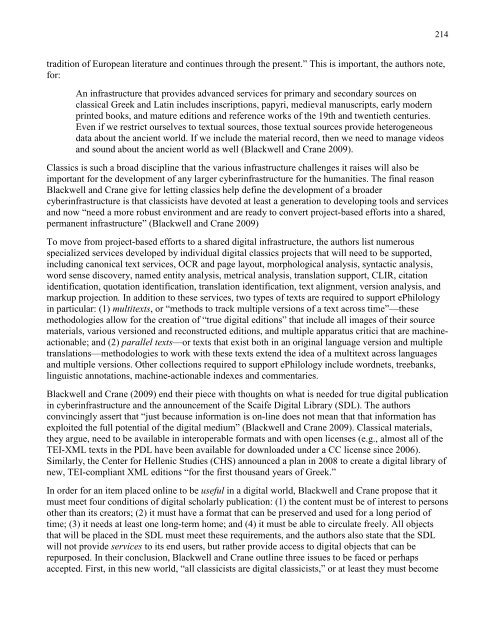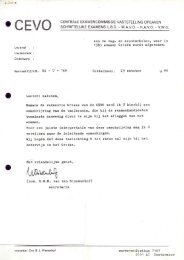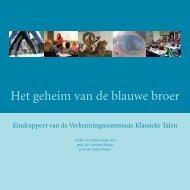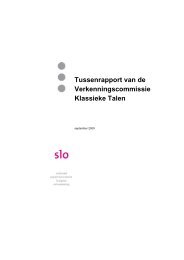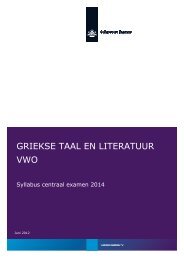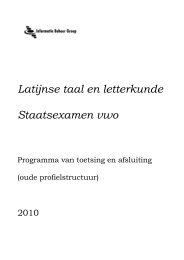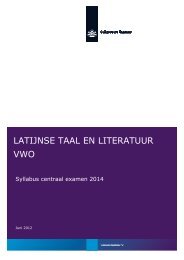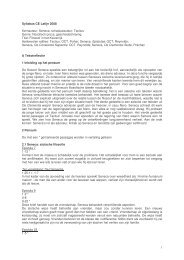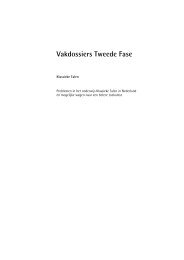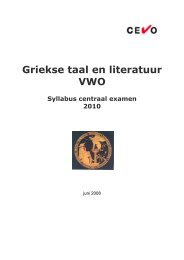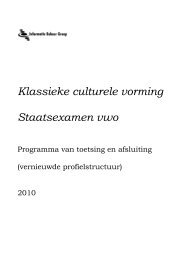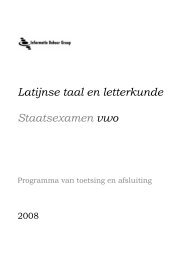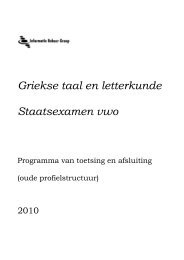Rome Wasn't Digitized in a Day - Council on Library and Information ...
Rome Wasn't Digitized in a Day - Council on Library and Information ...
Rome Wasn't Digitized in a Day - Council on Library and Information ...
You also want an ePaper? Increase the reach of your titles
YUMPU automatically turns print PDFs into web optimized ePapers that Google loves.
214<br />
traditi<strong>on</strong> of European literature <strong>and</strong> c<strong>on</strong>t<str<strong>on</strong>g>in</str<strong>on</strong>g>ues through the present.” This is important, the authors note,<br />
for:<br />
An <str<strong>on</strong>g>in</str<strong>on</strong>g>frastructure that provides advanced services for primary <strong>and</strong> sec<strong>on</strong>dary sources <strong>on</strong><br />
classical Greek <strong>and</strong> Lat<str<strong>on</strong>g>in</str<strong>on</strong>g> <str<strong>on</strong>g>in</str<strong>on</strong>g>cludes <str<strong>on</strong>g>in</str<strong>on</strong>g>scripti<strong>on</strong>s, papyri, medieval manuscripts, early modern<br />
pr<str<strong>on</strong>g>in</str<strong>on</strong>g>ted books, <strong>and</strong> mature editi<strong>on</strong>s <strong>and</strong> reference works of the 19th <strong>and</strong> twentieth centuries.<br />
Even if we restrict ourselves to textual sources, those textual sources provide heterogeneous<br />
data about the ancient world. If we <str<strong>on</strong>g>in</str<strong>on</strong>g>clude the material record, then we need to manage videos<br />
<strong>and</strong> sound about the ancient world as well (Blackwell <strong>and</strong> Crane 2009).<br />
Classics is such a broad discipl<str<strong>on</strong>g>in</str<strong>on</strong>g>e that the various <str<strong>on</strong>g>in</str<strong>on</strong>g>frastructure challenges it raises will also be<br />
important for the development of any larger cyber<str<strong>on</strong>g>in</str<strong>on</strong>g>frastructure for the humanities. The f<str<strong>on</strong>g>in</str<strong>on</strong>g>al reas<strong>on</strong><br />
Blackwell <strong>and</strong> Crane give for lett<str<strong>on</strong>g>in</str<strong>on</strong>g>g classics help def<str<strong>on</strong>g>in</str<strong>on</strong>g>e the development of a broader<br />
cyber<str<strong>on</strong>g>in</str<strong>on</strong>g>frastructure is that classicists have devoted at least a generati<strong>on</strong> to develop<str<strong>on</strong>g>in</str<strong>on</strong>g>g tools <strong>and</strong> services<br />
<strong>and</strong> now “need a more robust envir<strong>on</strong>ment <strong>and</strong> are ready to c<strong>on</strong>vert project-based efforts <str<strong>on</strong>g>in</str<strong>on</strong>g>to a shared,<br />
permanent <str<strong>on</strong>g>in</str<strong>on</strong>g>frastructure” (Blackwell <strong>and</strong> Crane 2009)<br />
To move from project-based efforts to a shared digital <str<strong>on</strong>g>in</str<strong>on</strong>g>frastructure, the authors list numerous<br />
specialized services developed by <str<strong>on</strong>g>in</str<strong>on</strong>g>dividual digital classics projects that will need to be supported,<br />
<str<strong>on</strong>g>in</str<strong>on</strong>g>clud<str<strong>on</strong>g>in</str<strong>on</strong>g>g can<strong>on</strong>ical text services, OCR <strong>and</strong> page layout, morphological analysis, syntactic analysis,<br />
word sense discovery, named entity analysis, metrical analysis, translati<strong>on</strong> support, CLIR, citati<strong>on</strong><br />
identificati<strong>on</strong>, quotati<strong>on</strong> identificati<strong>on</strong>, translati<strong>on</strong> identificati<strong>on</strong>, text alignment, versi<strong>on</strong> analysis, <strong>and</strong><br />
markup projecti<strong>on</strong>. In additi<strong>on</strong> to these services, two types of texts are required to support ePhilology<br />
<str<strong>on</strong>g>in</str<strong>on</strong>g> particular: (1) multitexts, or “methods to track multiple versi<strong>on</strong>s of a text across time”—these<br />
methodologies allow for the creati<strong>on</strong> of “true digital editi<strong>on</strong>s” that <str<strong>on</strong>g>in</str<strong>on</strong>g>clude all images of their source<br />
materials, various versi<strong>on</strong>ed <strong>and</strong> rec<strong>on</strong>structed editi<strong>on</strong>s, <strong>and</strong> multiple apparatus critici that are mach<str<strong>on</strong>g>in</str<strong>on</strong>g>eacti<strong>on</strong>able;<br />
<strong>and</strong> (2) parallel texts—or texts that exist both <str<strong>on</strong>g>in</str<strong>on</strong>g> an orig<str<strong>on</strong>g>in</str<strong>on</strong>g>al language versi<strong>on</strong> <strong>and</strong> multiple<br />
translati<strong>on</strong>s—methodologies to work with these texts extend the idea of a multitext across languages<br />
<strong>and</strong> multiple versi<strong>on</strong>s. Other collecti<strong>on</strong>s required to support ePhilology <str<strong>on</strong>g>in</str<strong>on</strong>g>clude wordnets, treebanks,<br />
l<str<strong>on</strong>g>in</str<strong>on</strong>g>guistic annotati<strong>on</strong>s, mach<str<strong>on</strong>g>in</str<strong>on</strong>g>e-acti<strong>on</strong>able <str<strong>on</strong>g>in</str<strong>on</strong>g>dexes <strong>and</strong> commentaries.<br />
Blackwell <strong>and</strong> Crane (2009) end their piece with thoughts <strong>on</strong> what is needed for true digital publicati<strong>on</strong><br />
<str<strong>on</strong>g>in</str<strong>on</strong>g> cyber<str<strong>on</strong>g>in</str<strong>on</strong>g>frastructure <strong>and</strong> the announcement of the Scaife Digital <strong>Library</strong> (SDL). The authors<br />
c<strong>on</strong>v<str<strong>on</strong>g>in</str<strong>on</strong>g>c<str<strong>on</strong>g>in</str<strong>on</strong>g>gly assert that “just because <str<strong>on</strong>g>in</str<strong>on</strong>g>formati<strong>on</strong> is <strong>on</strong>-l<str<strong>on</strong>g>in</str<strong>on</strong>g>e does not mean that that <str<strong>on</strong>g>in</str<strong>on</strong>g>formati<strong>on</strong> has<br />
exploited the full potential of the digital medium” (Blackwell <strong>and</strong> Crane 2009). Classical materials,<br />
they argue, need to be available <str<strong>on</strong>g>in</str<strong>on</strong>g> <str<strong>on</strong>g>in</str<strong>on</strong>g>teroperable formats <strong>and</strong> with open licenses (e.g., almost all of the<br />
TEI-XML texts <str<strong>on</strong>g>in</str<strong>on</strong>g> the PDL have been available for downloaded under a CC license s<str<strong>on</strong>g>in</str<strong>on</strong>g>ce 2006).<br />
Similarly, the Center for Hellenic Studies (CHS) announced a plan <str<strong>on</strong>g>in</str<strong>on</strong>g> 2008 to create a digital library of<br />
new, TEI-compliant XML editi<strong>on</strong>s “for the first thous<strong>and</strong> years of Greek.”<br />
In order for an item placed <strong>on</strong>l<str<strong>on</strong>g>in</str<strong>on</strong>g>e to be useful <str<strong>on</strong>g>in</str<strong>on</strong>g> a digital world, Blackwell <strong>and</strong> Crane propose that it<br />
must meet four c<strong>on</strong>diti<strong>on</strong>s of digital scholarly publicati<strong>on</strong>: (1) the c<strong>on</strong>tent must be of <str<strong>on</strong>g>in</str<strong>on</strong>g>terest to pers<strong>on</strong>s<br />
other than its creators; (2) it must have a format that can be preserved <strong>and</strong> used for a l<strong>on</strong>g period of<br />
time; (3) it needs at least <strong>on</strong>e l<strong>on</strong>g-term home; <strong>and</strong> (4) it must be able to circulate freely. All objects<br />
that will be placed <str<strong>on</strong>g>in</str<strong>on</strong>g> the SDL must meet these requirements, <strong>and</strong> the authors also state that the SDL<br />
will not provide services to its end users, but rather provide access to digital objects that can be<br />
repurposed. In their c<strong>on</strong>clusi<strong>on</strong>, Blackwell <strong>and</strong> Crane outl<str<strong>on</strong>g>in</str<strong>on</strong>g>e three issues to be faced or perhaps<br />
accepted. First, <str<strong>on</strong>g>in</str<strong>on</strong>g> this new world, “all classicists are digital classicists,” or at least they must become


